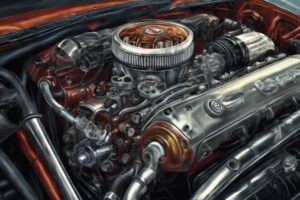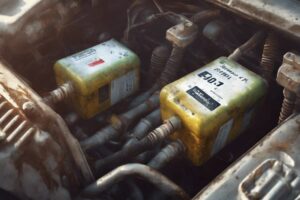When considering
premium air for tires, you benefit from
improved fuel economy, stable pressure levels, and
longer tire lifespan.
Environmental advantages include reduced top-ups, prevention of corrosion, and enhanced vehicle performance. Drawbacks like
cost comparison and limited availability should be weighed against benefits.
Different premium air types vary in composition and nitrogen content. Essential maintenance includes
regular pressure checks and proper inflation levels for fuel efficiency and safety.
What You Need to Know
- Premium tire air enhances fuel economy and extends tire lifespan significantly.
- Drawbacks include higher cost, limited availability, and potential performance impact.
- Environmental benefits include reduced pressure loss, lower moisture content, and prevention of tire rot.
- Maintenance tips stress regular pressure checks, ideal inflation levels, and reputable service for extended tire life.
Benefits of Premium Tire Air
By using
premium tire air, you can experience improved fuel economy and
reduced pressure variation, leading to enhanced efficiency.
Nitrogen-filled tires maintain
stable pressure levels better than those filled with regular air, resulting in fewer fluctuations that can impact fuel consumption.
This stability not only boosts
fuel efficiency but also contributes to a
longer tire lifespan due to reduced wear and tear caused by underinflation.
Also, the use of nitrogen in tires has a positive
environmental impact by decreasing the need for frequent top-ups, thereby reducing overall resource consumption.
Another environmental benefit of premium tire air is the prevention of wheel corrosion and tire rot.
Nitrogen helps to lower the moisture content within the tire, which in turn slows down the oxidation process that leads to corrosion and degradation.
By maintaining enhanced tire pressure and reducing
moisture-related damage, nitrogen-filled tires not only enhance vehicle performance but also support environmental sustainability.
Drawbacks of Premium Tire Air
While premium tire air presents some benefits, it’s important to deliberate on its drawbacks as well to make an informed decision about its usage. Here are some key drawbacks to take into account:
- Cost comparison: Premium tire air may not justify the additional cost for average drivers when compared to regular air, especially considering the minimal benefits it offers over nitrogen-filled tires.
- Performance impact: For most drivers, premium air for tires may not provide noticeable performance improvements during everyday driving, making it a less attractive option.
- Limited availability: In certain areas, the availability of premium tire air may be limited, making it inconvenient for those interested in using it.
- Maintenance complexity: The need to consistently refill tires with premium air can add to the maintenance complexity, requiring more frequent visits to service stations.
- Environmental impact: The production and distribution of premium tire air may have environmental implications, which could be a concern for environmentally-conscious drivers.
Comparing Premium Air Types
When comparing different types of
premium air for tires, you’ll find variations in the composition and benefits they offer.
Premium air often contains a higher percentage of nitrogen compared to regular air, which can lead to improved pressure retention.
Some services offer
nitrogen blends that also include oxygen and other gases to enhance
tire performance.
These blends aim to maintain more
stable tire pressure, contributing to better
fuel economy and prolonging
tire lifespan.
The levels of nitrogen and other gases in the blend can affect the overall benefits provided to your tires.
While nitrogen-rich blends are commonly used for their advantageous properties, the addition of specific levels of oxygen can also impact tire performance.
Understanding the composition of different premium air types, including nitrogen blends and oxygen levels, can help you choose the option that best suits your driving needs.
Be sure to inquire about the specific
gas composition when opting for premium air services to maximize the benefits for your tires.
Can Leasing a Car Negatively Impact Tire Air Quality?
Leasing a car pitfalls explained: Leasing a car can negatively impact tire air quality if the lessee fails to properly maintain the tires. Underinflated tires can affect fuel efficiency and safety, leading to increased emissions and air pollution. Regular tire checks and maintenance are essential to minimize the environmental impact of leasing a car.
Will Using Premium Air for Tires Help Prevent Cracked Rims?
Using premium air for tires can potentially help prevent the risks of driving with a cracked rim. Proper tire inflation helps distribute the weight of the vehicle evenly, reducing the strain on the rims. However, it’s essential to inspect and repair any cracked rims to ensure safe driving.
Essential Maintenance Tips
When maintaining premium air-filled tires, consistently monitoring tire pressure is essential to ensuring peak performance and safety. Proper care and best practices for maintaining your tires include the following:
- Regular Pressure Checks: Use a standard gauge to check tire pressure regularly, even with premium air-filled tires.
- Ideal Inflation Levels: Ensure your tires are properly inflated to maintain peak performance and safety on the road.
- Reputable Maintenance Services: Trust reputable tire services for maintenance and pressure checks to guarantee accuracy.
- Fuel Efficiency and Safety: Neglecting tire pressure can lead to decreased fuel efficiency and potential safety hazards, emphasizing the importance of proper care.
- Extended Tire Life: Consistent monitoring of tire pressure is vital for extending tire life and maximizing performance, making it a best practice for all drivers.
Common Inquiries About Premium Air
If you’re considering switching to
premium air for your tires, you may have some common inquiries about its benefits and practicality.
When it comes to
cost comparison, nitrogen filling for tires can range up to $20 per tire depending on the service provider.
While this initial cost may seem higher than regular air, the
reduced pressure loss and
improved fuel economy offered by nitrogen-filled tires can result in long-term savings.
As for safety concerns,
mixing regular air with nitrogen in tires is safe and won’t cause harmful reactions.
In emergencies, if you need to top off a nitrogen-filled tire with regular air, it can be done without significant issues.
Keep in mind that nitrogen-filled tires require
less frequent refills compared to regular air-filled tires, making them a convenient choice for many drivers.
As an Amazon Associate we earn from qualifying purchases.













